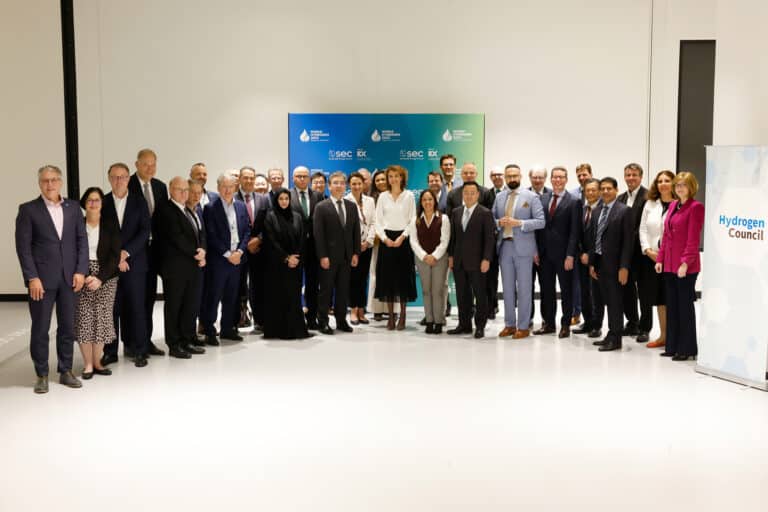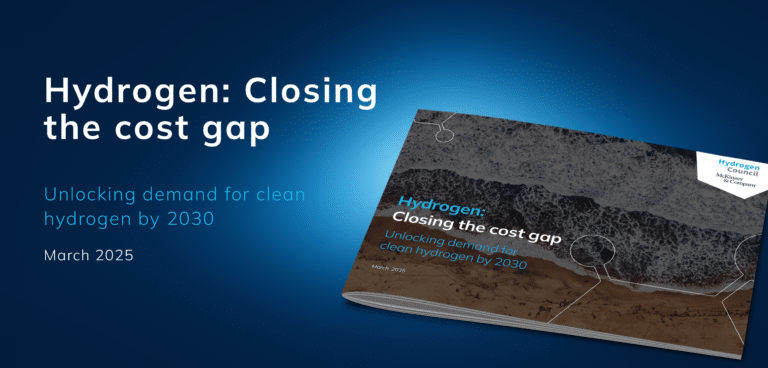Kawasaki Heavy Industries was one of 13 founding members of the Hydrogen Council when the global CEO-led initiative was created in 2017. Why did Kawasaki want to be a part of the Hydrogen Council?
Kawasaki announced the concept of low carbon hydrogen supply chains in 2010. Henceforth, by effectively utilizing the synergies among Kawasaki Group technologies covering air, sea and land, we have been developing and demonstrating necessary technologies required for the establishment of a supply chain that “produces, transports, stores, and uses” hydrogen.
The technology development is successfully ongoing, while there are still issues to be solved for social deployment of hydrogen, such as demand activation and cost reduction of hydrogen. I would like to work together with many other companies and organizations through the Hydrogen Council to realize a safe and reliable hydrogen- society
With Kawasaki Chairman Yoshinori Kanehana serving as Co-Chair of the Hydrogen Council, what is his vision for the Council as the industry’s global voice?
The Hydrogen Council brings together close to 150 leading global companies from a variety of industries. While each member individually may have different areas of interest, as a whole Council, we share the common understanding that hydrogen will play an important role in the energy transition. We can greatly influence the realization of carbon neutrality using hydrogen through collaboration and combination of the knowledge, experience and strengths of our members.
I believe it is time for us to be more active in disseminating the input we have accumulated since our founding in 2017. We will not limit ourselves to internal discussions, but will actively reach out to the outside world, disseminate information, increase our network, and overcome hurdles on the path toward the social implementation of hydrogen.
I would also like the Council to continue to be a place where various members can discuss and collaborate and expect the Council to actively support such collaboration and other opportunities.
Through the Hydrogen Council, Kawasaki is collaborating with players across key industrial sectors to help set up the right conditions and infrastructures to develop hydrogen-powered solutions, and driven initiatives to raise awareness of the multiple benefits of their more widespread adoption.
Can you tell us more about the important work of the Council? Perhaps you have a couple of examples to share?
Since its foundation, the Hydrogen Council, through continuous discussion and collaboration among participating members, has been conducting various studies covering economy, energy and resource security, and carbon neutrality, in order to establish a roadmap and vision for achieving ambitious deployment of hydrogen. The results of these studies have helped various companies and institutions to forecast and plan for the future, and have also led to the publication of national hydrogen strategies and roadmaps by various governments.
With private companies, policy makers, and investors required to take joint action to realize a hydrogen economy, the Hydrogen Council, a group of leading private companies, is one of the few organizations capable of making policy recommendations to solve various issues as the voice of the industry based on the results of our conducted studies, and to encourage investors to invest in the hydrogen economy.
Kawasaki, together with private and governmental partners, has conducted hydrogen demonstration projects in various locations in Japan and abroad, and one thing that is common to all of these projects is that the understanding of stakeholders such as local residents is essential. The Hydrogen Council is an organization of hydrogen experts who actually produce, transport, and use hydrogen, so we can provide information on hydrogen safety based on specific examples and actual results, and contribute greatly to improving social acceptance of hydrogen.
In 2022 the world’s first liquefied hydrogen carrier, Suiso Frontier, completed its first international voyage from Victoria, Australia to Kobe, Japan. Designed and built by Kawasaki, this must have been a very proud moment. Can you tell us more about this?
The achievement of maritime transportation of liquefied hydrogen by the Suiso Frontier is a big step toward the realization of a hydrogen society. We consider that it is essential to establish hydrogen transportation technologies on various hydrogen energy carriers in order to ensure a stable supply of hydrogen meeting the demands of various sectors in various regions for the realization of a hydrogen society.
The successful pilot demonstration by the Suiso Frontier has contributed to the expansion of liquefied hydrogen supply chain solutions. We achieved this milestone owing to the tremendous cooperation by the Australian and Japanese governments and our partner companies. We will continue to cooperate with various companies to contribute to safe and stable hydrogen supply.
About The Hydrogen Council
The Hydrogen Council is a global CEO-led initiative that brings together leading companies with a united vision and long-term ambition for hydrogen to foster the clean energy transition. The Council believes that hydrogen has a key role to play in reaching our global decarbonization goals by helping to diversify energy sources worldwide, foster business and technological innovation as drivers for long-term economic growth, and decarbonize hard-to-abate sectors.
Using its global reach to promote collaboration between governments, industry and investors, the Council provides guidance on accelerating the deployment of hydrogen solutions around the world. It also acts as a business marketplace, bringing together a diverse group of 140+ companies based in 20+ countries across the entire hydrogen value chain, including large multinationals, innovative SMEs, and investors.
The Hydrogen Council also serves as a resource for safety standards and an interlocutor for the investment community, while identifying opportunities for regulatory advocacy in key geographies.
To find out more visit www.hydrogencouncil.com and follow us on Twitter @HydrogenCouncil and LinkedIn.
Joanna Sampson, Communications Manager, Hydrogen Council
joanna.sampson@hydrogencouncouncil.com



